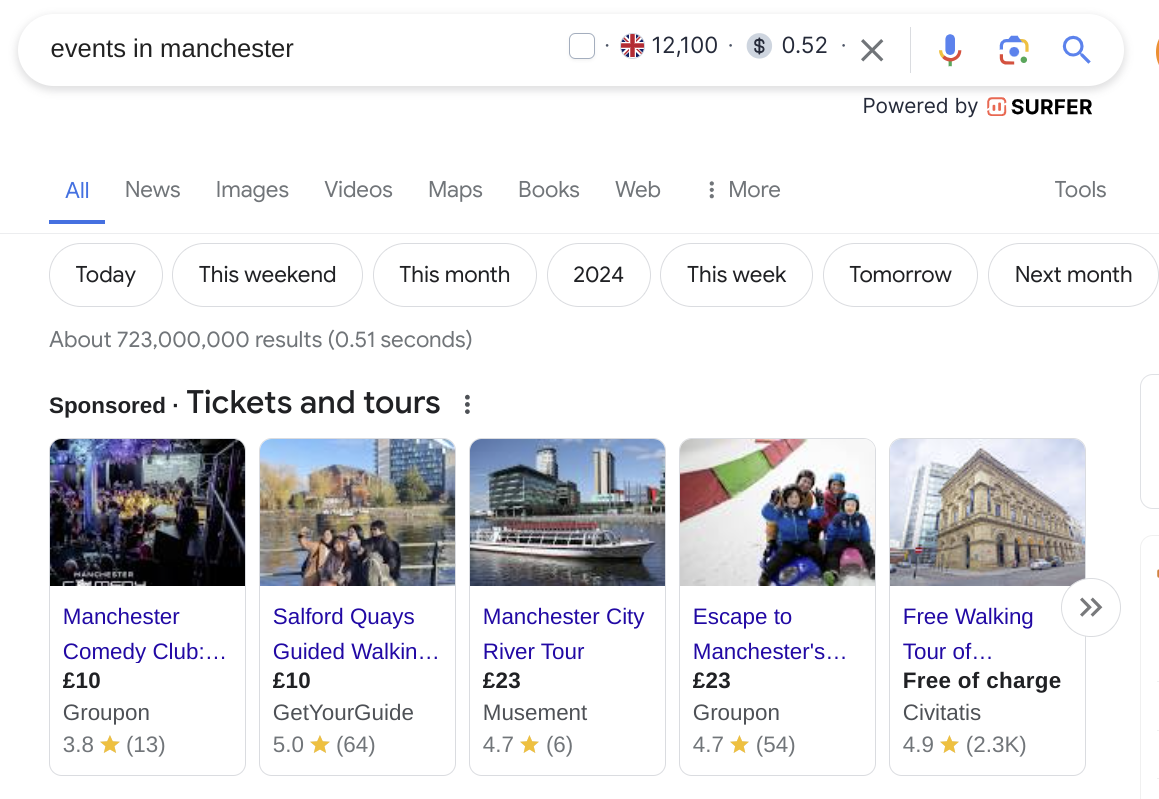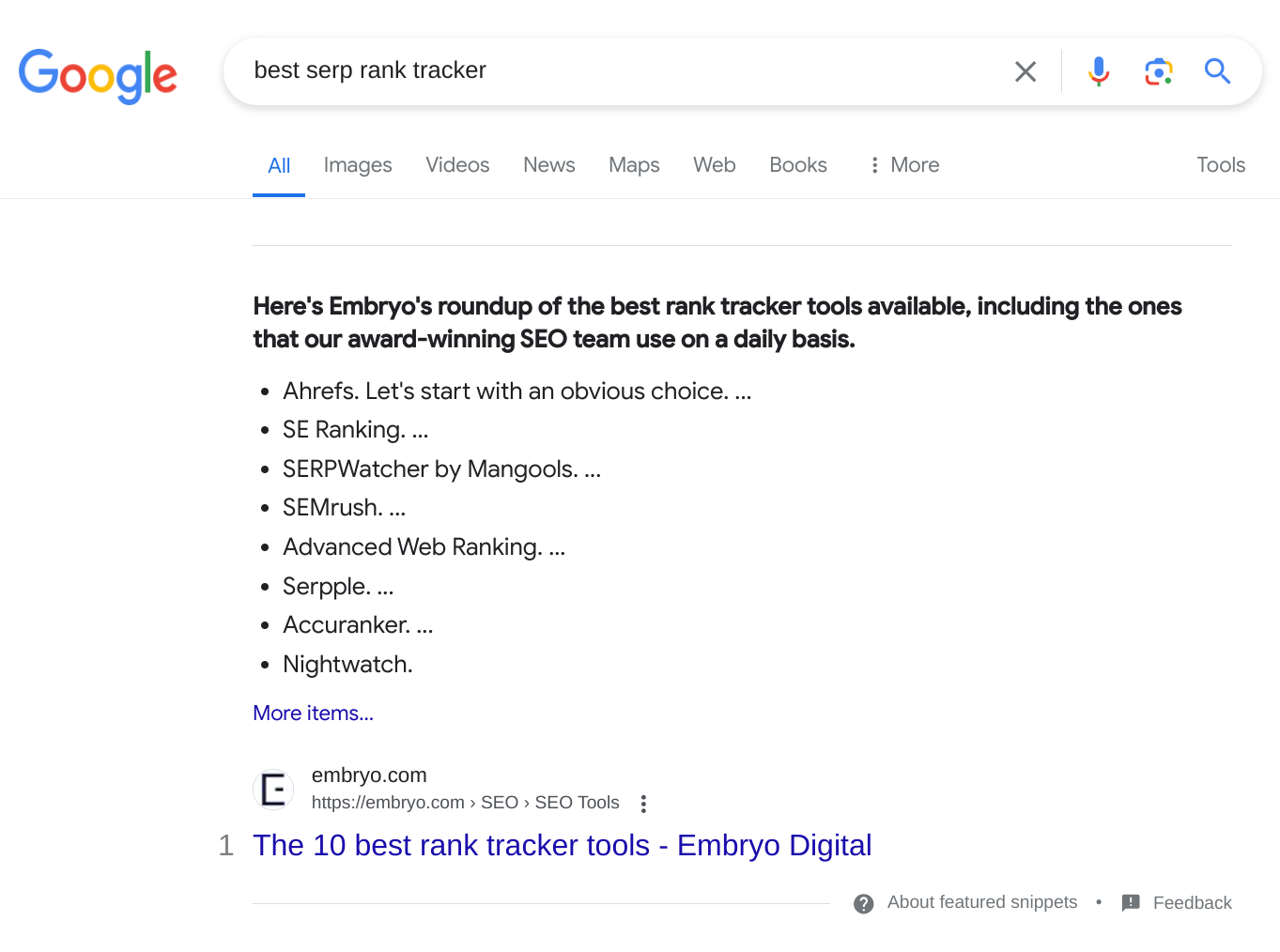If you’re looking to boost your SEO strategy, rich results are the place to start. With rich results significantly improving website traffic – with an average of 58 clicks per 100 queries – this method is a great way to use structured data markup to give search engines more information about your content.
Rich results are a great eye-opener for SEOs starting a new website strategy, often nabbing quick wins early on. As Google pivots for more E-E-A-T quality content, rich results directly feed into what users – and search engines – are looking for, making it a sensible start for most SEO activity.
A closer look at rich results
On May 17, 2016, Google introduced “rich cards”, quickly turning into ‘rich snippets’ and finally becoming what we know as rich results today.
By using a blend of structured data, schema markup and JSON-LD code, rich results are Google’s answer to user-focused results on the SERP.
Once rich results came out of Beta in 2020, Google defined them as “experiences on Google Search that go beyond the standard blue link. They’re powered by structured data and can include carousels, images, or other non-textual elements.
“Over the last couple years we’ve developed the Rich Results Test to help you test your structured data and preview your rich results.”
Understanding rich results through structured data markup
If rich results pull up the ‘important’ stuff your users are looking for in a query, how do search engines know what information is important? This is where structured data markup comes in clutch.
Think of structured data markup as the language that Google understands, with the markups working like labels on the various ‘tubs’ of website content. Instead of just text or images, structured data uses a specific vocabulary to accurately name elements on your website, such as:
- Product names
- Dates
- Events
- Authors

Formats for Structured Data Markup
JSON-LD (JavaScript Object Notation for Linked Data)
JSON-LD is the go-to format for Google, as it’s easy to implement and embed within a <script> tag in the head section of your webpage. It also has little to no impact on your website’s overall appearance, but might need more technical SEO knowledge.
Microdata
Microdata embeds data directly within your HTML code using specific attributes. While it seamlessly fits into your existing HTML code, it can make it harder to read overall.
RDFa (Resource Description Framework in Attributes)
Less common than JSON-LD and microdata, RDFa embeds data within HTML attributes but uses a different syntax. While pretty flexible, it can be difficult to implement – just down to the sheer complexity of this particular format.
Different types of rich results
As user intent changes and develops over time, Google continues to add new rich results. At the time of writing, here is a comprehensive list of rich results that you can use to inspire your strategies and boost rankings.
Take a look at the screenshot from Google results below. This is what is known as a featured snippet. Featured snippets are Google’s way of delivering the most important aspect of the answer to a query, taking the result from a top ranking piece of content. Whilst implementing schema can improve the chances of scoring a featured snippet, Google mainly looks for useful content to determine which snippet is worthy.

The basics
- Breadcrumbs: Shows the user’s location within the website’s hierarchy for navigation purposes.
- Sitelinks: Shows further links within the same website for a specific search query.
- Favicons: The small icon or logo from a website.
- Product information
- Events
- Recipes
- Reviews
- FAQs
- How-to instructions
- Videos
- Local Business information
- Organisational information
- Book details and reviews
- Music search results
- News articles
- Image packs
- Knowledge panels
So, how do I get rich results?
Once you’ve chosen a suitable data format, use tools like Google’s Search Console Markup Helper to help you directly create the code snippet.
Then, input the code within the <head> section of your webpage and make sure it’s validated using Google’s Rich Results Test Tool.
Once you’ve got the coding out of the way, it’s time to optimise your content to support those rich results. To keep your content eligible, make sure to use high-quality product images, accurate pricing information, and trustworthy customer reviews for product listings. The same goes for pages on recipes, events and reviews, with clear and concise information that your user’s are actively looking for.
With these methods, you should be able to get those rich results in no time.

One of our SEO Account Managers, Ben Carter, has this to say about rich results:
“While not a direct ranking factor, if you get rich results, your result on the SERP will be larger and you’ll certainly have that better share of voice on there.
But also, you’ll become more enticing to click.
So for me, if I see a result that doesn’t have a review schema but then the next product has a 5/5 star rating, shows it’s in stock and shows the price, then it’s going to make me click and therefore will have an increased click-through-rate.”
Get your rich results today
When done correctly, rich results can be incredibly rewarding. Make sure to implement them early on in your SEO projects, ensuring your website offers a positive user experience alongside structured data implementation at any opportunity.
Finally, to keep an eye on your efforts, use Google Search Console to regularly track and monitor the performance of your rich results. Always adapt your approach based on your findings – and see those stats soar!
But what if you need some extra guidance on your existing SEO plans? Or prefer someone else to come up with a great strategy for your business? Our experts can help.
FAQs
Answered by James Welch
What percent of people click on rich results?
Google doesn’t share data on how many people click on rich results. It is thought that this figure sits around 30-40%.
What are the negatives of rich results?
They push truly organic results even further down the rankings, which means people are more likely to click on paid results, which aren’t always as honest or trustworthy as organic results.
Do all search users get the same rich results for the same search?
No. Google is very personalised and rich results can be based on multiple factors such as location and previous searches.
How does location affect rich results?
The location has had varying impacts on the SERPs over the past few years however it is now becoming a more influential factor in SEO. Creating location-based pages is becoming a popular tactic for large websites again.












